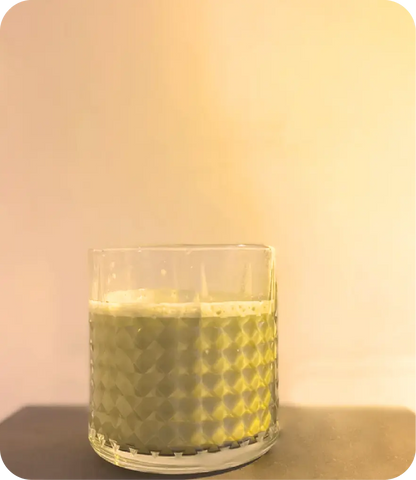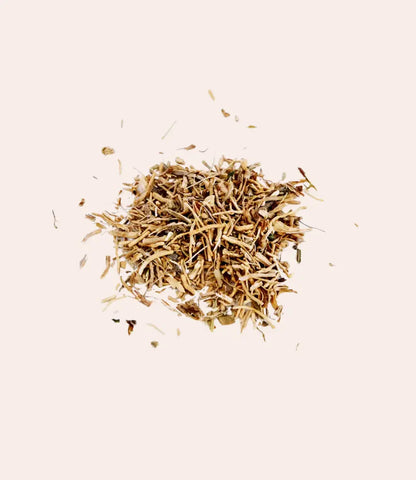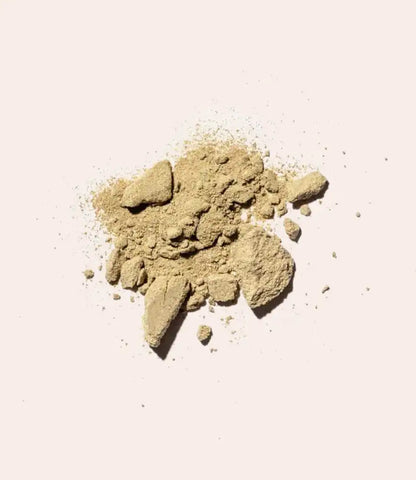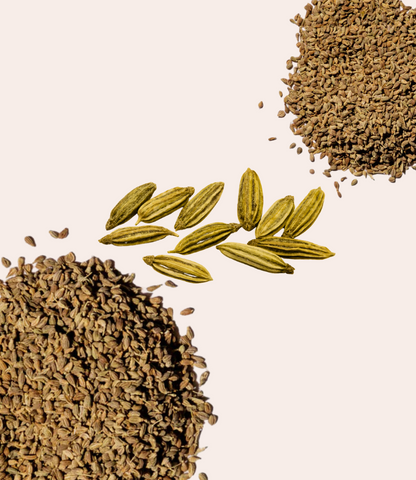
The Progesterone Puzzle: How to Naturally Increase Your Levels and Feel Yourself
Progesterone is a crucial hormone that plays a role in many bodily functions, including reproductive health, sleep, and mood. However, many people, especially women, may experience low progesterone levels, leading to various health issues.
Progesterone is a steroid hormone that plays a critical role in regulating the menstrual cycle and pregnancy. It is produced in the ovaries, adrenal glands, and placenta during pregnancy. Progesterone levels naturally fluctuate throughout the menstrual cycle, reaching their peak during the luteal phase, which occurs after ovulation.
Low progesterone levels can cause a range of symptoms, including irregular periods, infertility, mood swings, anxiety, insomnia and can also impact bone density and increase the risk of certain cancers - a key reason why many experience PMS.
Several factors can lead to low progesterone levels, including stress, poor diet, sedentary lifestyle, and exposure to toxins.
Environmental Factors That Impact Hormones
Several environmental factors can impact hormone balance and progesterone production, including:
- Exposure to toxins: Exposure to toxins, such as pesticides, plastics, and household chemicals, can interfere with hormone balance and progesterone production.
- Hormone-disrupting chemicals: Certain chemicals, such as bisphenol-A (BPA) and phthalates, can mimic estrogen in the body and interfere with hormone balance.
It is crucial to understand the various environmental factors that can influence hormones. To minimize exposure to harmful toxins and chemicals that disrupt hormones, it is advisable to adopt certain lifestyle changes. Opting for organic foods, employing natural cleaning and personal care products, and refraining from using plastic containers and water bottles are essential steps. Additionally, integrating stress-reducing techniques like meditation or yoga into one's routine can play a significant role in maintaining a healthy hormone balance.
Related to: 6 Powerful Herbal Allies to Help Alleviate Stress
Dietary Strategies for Boosting Progesterone Naturally
Diet plays a crucial role in hormone balance, including progesterone. Incorporating certain foods into your diet can help support progesterone production and balance your hormones.
Some of the best foods for increasing progesterone levels include:
- Foods rich in zinc, such as oysters, pumpkin seeds, and grass-fed beef.
- Foods high in vitamin C, such as citrus fruits, strawberries, and bell peppers.
- Foods rich in magnesium, such as spinach, almonds, and avocado.
- Healthy fats, such as those found in fatty fish, nuts, and seeds.
Related to: Thinx! x Xula Hormonal Balance Salad Bowl
It is important to explore the effects of specific dietary choices on hormone regulation. It is worth noting that certain foods have the potential to lower progesterone levels, which is a key hormone in the female reproductive system.
Sugar, commonly found in desserts and sweetened beverages, has been associated with adverse effects on hormone balance, including progesterone levels. Likewise, processed foods, which often contain artificial additives, preservatives, and unhealthy fats, may also disrupt hormonal equilibrium and contribute to decreased progesterone levels.
Furthermore, it is crucial to address the potential impact of alcohol consumption on hormone regulation. Excessive alcohol intake has been linked to various hormonal imbalances, including reductions in progesterone levels. Alcohol can interfere with the normal functioning of the endocrine system, leading to disruptions in hormone production and secretion.
Educating ourselves about the impact of these dietary choices on hormonal health can empower us to make informed decisions regarding our nutrition. Encouraging a balanced and wholesome diet that prioritizes whole foods, lean proteins, fruits, vegetables, and whole grains can help maintain optimal hormone levels. It is also important to emphasize the significance of moderation when it comes to sugary treats, processed foods, and alcohol consumption, as excessive indulgence in these items can potentially have negative consequences on hormonal health and overall well-being.
Lifestyle Changes for Hormone Balance
In addition to dietary changes, certain lifestyle changes can help promote hormone balance and support healthy progesterone levels.
Regular exercise is one of the most effective strategies in this regard. Engaging in physical activity not only helps to reduce stress but also promotes healthy circulation throughout the body. By incorporating exercise into their routine, you support the equilibrium of hormones and enhance their overall well-being.
In addition to exercise, emphasizing the significance of sufficient sleep is crucial. A lack of sleep can have detrimental effects on hormone balance, particularly impacting progesterone levels. You should prioritize restful sleep and establish healthy sleep habits that can positively influence your hormonal health.
Managing stress is paramount for maintaining hormone balance. High levels of stress can disrupt the delicate equilibrium of hormones, including progesterone production. We know this advice is not easy to apply, but introducing stress-reducing practices, such as yoga, meditation, or deep breathing exercises, can be immensely beneficial. By fostering an understanding of stress management techniques - like meditation or yoga- you can proactively address stress and support hormone balance effectively.
Herbal Remedies for Progesterone Support
Renowned herbalists have long recognized the potential of various herbs to aid in the production of progesterone and promote hormonal balance. Among these beneficial herbs are c, black cohosh, and dong quai, each with its unique properties and historical significance in supporting female reproductive health.
Chasteberry, a herb steeped in centuries of traditional use, has garnered attention for its ability to bolster progesterone levels and alleviate symptoms associated with premenstrual syndrome (PMS). This remarkable herb has shown promise in promoting hormonal equilibrium, providing relief from discomfort and mood swings commonly experienced during the menstrual cycle.
Another notable herb, black cohosh, has been cherished for its contributions to female reproductive health. Revered for its capacity to alleviate hot flashes and other menopausal symptoms, black cohosh supports hormone balance, offering women a natural approach to navigating the transitional phase of menopause.
Lemon balm, also known as Melissa officinalis, is an herb that has been traditionally used for various medicinal purposes. While lemon balm is not directly associated with balancing hormones or specifically increasing progesterone levels, it may indirectly support hormonal balance through its calming and stress-reducing properties. Lemon balm contains various compounds with antioxidant properties that can be beneficial for overall health and may indirectly contribute to hormonal balance.
Burdock root (Arctium lappa) is a plant traditionally used in herbal medicine for various health purposes like detoxifying, anti-inflammatory effects and blood sugar regulation.
These herbs, among many others, hold the potential to harmonize hormones and enhance overall reproductive health. While each person's experience may vary, the historical use and emerging scientific evidence surrounding these herbs provide a foundation for exploring their potential benefits.
Related to: Trust Your Gut: How CBD and Herbs Can Balance Your Digestive System
CBD for Progesterone Support
CBD, or cannabidiol, is a non-psychoactive compound found in the cannabis plant. It has been shown to have a variety of health benefits, including
supporting hormone balance and reducing anxiety and stress, both of which can impact progesterone levels.
CBD works by interacting with the body's endocannabinoid system, which plays a role in regulating hormone production and balance. Research suggests that CBD can help reduce cortisol, the stress hormone, which can interfere with progesterone production.
However, more research is needed to fully understand the effects of CBD on progesterone levels and hormone balance. It is essential to talk to a healthcare provider before incorporating CBD into your routine, especially if you are pregnant or taking medication.
Conclusion to Feel Yourself Again
Progesterone plays a vital role in reproductive health, sleep, and mood. Low progesterone levels can cause a range of symptoms and impact overall health.
However, several natural strategies can help increase progesterone levels and promote hormone balance.
Incorporating a balanced and healthy diet, regular exercise, stress-reducing practices, and herbal remedies can help support progesterone production and hormone balance. Additionally, reducing exposure to toxins and hormone-disrupting chemicals can also support overall health.
Related to: Everything You Need to Know About The Cycle Duo
Sources
- Prior JC. Progesterone for Symptomatic Perimenopause Treatment - Progesterone politics, physiology, and potential for perimenopause. Facts V Vis Obgyn. 2011;3(2):109-20. PMID: 24753856; PMCID: PMC3987489.
- Komar CM. Peroxisome proliferator-activated receptors (PPARs) and ovarian function--implications for regulating steroidogenesis, differentiation, and tissue remodeling. Reprod Biol Endocrinol. 2005 Aug 30;3:41. doi 10.1186/1477-7827-3-41. PMID: 16131403; PMCID: PMC1266036.
- Thomas C, Gustafsson JÅ. Progesterone receptor-estrogen receptor crosstalk: a novel insight. Trends Endocrinol Metab. 2015 Sep;26(9):453-4. doi: 10.1016/j.tem.2015.08.002. Epub 2015 Aug 12. PMID: 26277479.














































